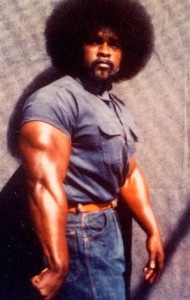The oxford English dictionary defines hypertrophy as ‘the enlargement of an organ or tissue from the increase in size of its cells.’ In body-builder parlance hypertrophy, or muscle-cell hypertrophy, is the state attained through regular sessions of applied
force through physical exertion, weight training, sets and reps. For Stanley ‘Tookie’ Williams, former leader and founder member (alongside Raymond Washington) of Los Angeles street gang the Crips, the principle of hypertrophy by force extended far beyond the makeshift garage gyms, and front lawn bench-press sessions of his South Central neighbourhood.
Born on December 29, 1953 Tookie’s rise to Crip leadership began in the spring of 1971, 34 years before his death by lethal injection in California’s San Quentin prison. After the last embers of the Black Panther Party, and their dashiki-wearing rivals Us, were snuffed out in the late 1960’s, a political hole was left in the African American Community of Los Angeles. This gap in the political consciousness was quickly filled by the misogynistic images of Blaxploitation cinema and a new capitalist individualism, embodied by the likes of Youngblood Priest: the coke dealing, whitey-hating, central character of Gordon Parks Jr’s Superfly. In the 2006 documentary Bastards of the Party, Chili, a former member of pre-Panther LA gang the Gladiators, explained the situation: ‘guys that I knew who were starch in the iron revolutionaries and would die for the movement, when I got out [of prison] they was telling me “it aint happening homeboy”1. Despite this apathetic migration into the zone of self-centeredness by older males, LA’s youth carried a memory of the organisation and brotherhood delivered by the Black Panthers. Stepping into the breach were the gangs, most notably Tookie’s Crips and their bitter rivals the Bloods. By Tookie’s account the Crips came into focus that spring when he and Raymond Washington joined forces and the Crips name was coined in a high school cafeteria. In Tookie’s own words ‘life seemed to accelerate after I met Raymond’2
Tookie’s experience of acceleration was characterised by a disturbing, even super-human, level of physical and psychic excess. Extreme bouts of violence; group sex, larceny, armed robbery, and murder, if not all perpetrated by him were certainly part of his everyday life. Underlying this vicious momentum was the perpetual quest for hypertrophy, and the continual growth of muscle mass. Tookie’s path towards invincibility remained unchallenged until he was hospitalised in 1976 by a number of .45 calibre bullets, fracturing a calf and shattering the bones in both his feet and ankles. Tookie’s road to recovery required something that had been alien to him for a long time, slowness.
Though Tookie’s physique was as muscular as ever, the limp that slowed his gait significantly decreased his effectiveness as a fearsome individual. By his admission ‘the years 1977 to 1979 were the lowest point of my life’3. Tookie’s wilderness years saw his hyper-speed reality exchanged for the world of a phencyclidine (aka PCP and Sherm) fuelled haze. It is here, in a drug den, that Tookie experienced a different type of acceleration; acceleration by default:
‘When my stepbrother Wayne was floating on Sherm, he sometimes moved in super-slow motion as if he was in another dimension. Once while I was getting my hair braided by my stepsister Demetri, Wayne was high on Sherm and got up in super-slow motion to creep over to where Demetri’s friend’s purse was. He took out the wallet and placed it under his jacket, then returned to his seat as if nothing had ever happened. I shook him out of his trance, and he wasn’t even aware of what he had done. Though we all laughed, it was one of the most bizarre things I had ever seen. In time I would do stranger things.’4
1 Bastards of the Party, Cle Shaheed Sloan, Fuqua Pictures; USA. 2006
2 Stanley ‘Tookie’ Williams, Redemption, Milo Books, England, 2004; pp. 82
3 Stanley ‘Tookie’ Williams, Redemption, Milo Books, England, 2004; pp. 173
4 Ibid pp. 175-176
